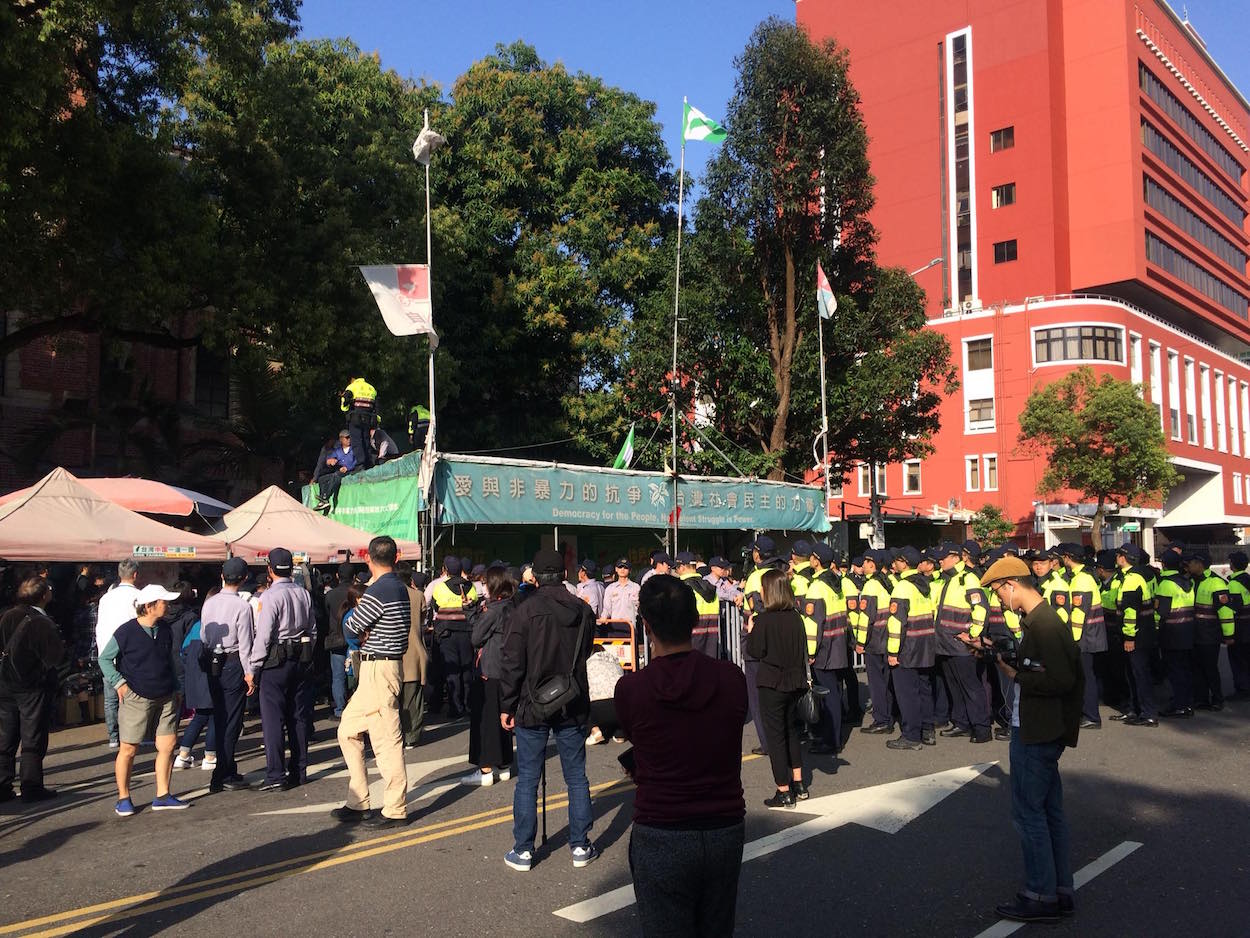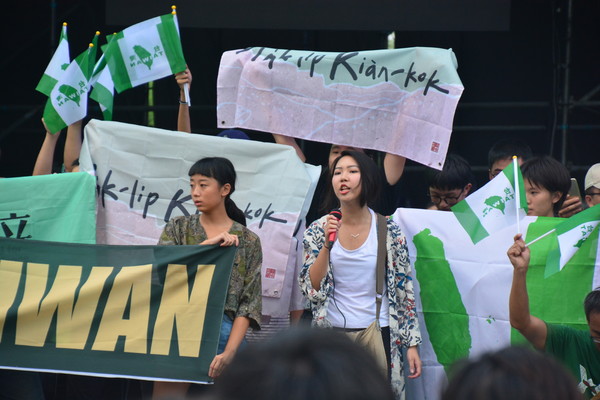by Brian Hioe
語言:
English
Photo Credit: Ko Wen-Je/Facebook
CIVIL SOCIETY groups have been critical of Taipei mayor Ko Wen-Je publicly stating that he intends for protest zones to be set up around the Legislative Yuan. Namely, Ko’s justification is that such zones are needed to prevent disruption to the lives of local residents living in residential areas around the Legislative Yuan and other government buildings, but civil society groups claim that this is an excuse to crackdown on protests in the area.
In particular, Ko Wen-Je has become increasingly criticized for policing practices in Taipei in past months. Earlier this month saw the eviction of the Alliance of Referendum for Taiwan/Free Taiwan Party’s (ART/FTP) occupation tent outside the Legislative Yuan by Taipei police, an unusual measure seeing as that the occupation had lasted outside the Legislative Yuan for ten years, and the occupation tent itself seems unlikely to have been a source of noise seeing as it was not usually occupied.
 Police dismantling the Alliance of Referendum for Taiwan/Free Taiwan Party’s occupation tent. Photo credit: Free Taiwan
Police dismantling the Alliance of Referendum for Taiwan/Free Taiwan Party’s occupation tent. Photo credit: Free Taiwan
Ko seems intends to clear out all of the political occupations around the Legislative Yuan, including an indigenous demonstration calling for the return of traditional territories, and pan-Blue anti-pension reform demonstrators mostly consisting of former military personnel that refer to themselves as the “800 Heroes.” Indigenous demonstrators have already received a 24 hour notice for eviction.
It is increasingly common for civil society activists to suspect that Ko Wen-Je’s actions are in part politically motivated, because Ko did not initially take action against the “800 Heroes” and instead went after the ART/FTP. For one, the eviction of the ART/FTP first is unusual seeing as the occupation was one which stressed peaceful and nonviolent protest, while the “800 Heroes” and other pan-Blue demonstrators had proved willing to use violence against the ART/FTP occupation due to conflicting views regarding Taiwan’s authoritarian history and the issue regarding unification/independence, including attacks on the ART/FTP tent and physical attacks on ART/FTP convenor Tsay Ting-Kuei. Even if Ko now intends to clear all of the occupation tents in government buildings around the Shandao Temple and NTU Hospital area, some perceive Ko as first seeking to target the ART/FTP, then expanding the scope of evictions after criticisms that his actions were selective in nature.
Namely, Ko Wen-Je has in the past year allowed for a number of police actions highly criticized by civil society. Ko took few actions against pro-unification mobsters that attacked pro-independence student demonstrators on the NTU campus during the Sing! China incident, for example, because the Sing! China concert on the NTU campus was held because of an initiative of Ko Wen-Je’s to conduct city-level exchanges between Taiwan and China. Ko did not take substantial steps to investigate unusual ties between attackers and Taipei city police either.
 Student demonstrators during the Sing! China incident at NTU. Photo credit: ETToday
Student demonstrators during the Sing! China incident at NTU. Photo credit: ETToday
Either way, despite being elected with the support of post-Sunflower youth activists, through allowing such actions by the police, Ko Wen-Je has largely lost the support of youth activists and members of Taiwanese civil society. Ko also registers decidedly out of step with the sentiments of the young people that supported him through defending Chiang Kai-Shek statues in Taiwan which remain as legacies of Chiang’s personality cult during the authoritarian period, praising Chiang Ching-Kuo as a model of political leadership, his close ties with James Soong of the PFP, who was responsible for putting down political dissidents during the authoritarian period as head of the Government Information Office, and making public appearances with “White Wolf” Chang An-lo, a former gang leader who was responsible for carrying out political killings for the KMT during the authoritarian period, and whose subordinates—including his son—were responsible for the NTU Sing! China incident beatings.
It is suspected by some that Ko has abandoned youth activists because he does not see them as a viable support base in 2018 elections, deciding instead to focus on appealing to more conservative Taipei city voters instead by adopting starkly pan-Blue positions. And so Ko may have only embraced youth activists opportunistically, in spite of Ko depicting himself in 2014 “nine-in-one” elections as an ordinary individual who had chosen to participate in politics. Perhaps youth activists were naive and overly trusting to embrace Ko, then.
Other acts of police violence have taken place under Ko’s watch. During the NPP’s protest against the Tsai administration’s planned changes to the Labor Standards Act, Taipei city carried out violent acts against protesters, including an incident in which a demonstrator had his head slammed into the glass of a police bus and the glass cracked. A number of restrictions on media were also enforced by Taipei police, such refusing to allow media outlets which were not major television networks or the four largest newspapers through barricades to cover protests, and arrests of journalist and even citizen livestreamers.
 Clashes between police and demonstrators during protests against the Labor Standards Act. Photo credit: Brian Hioe
Clashes between police and demonstrators during protests against the Labor Standards Act. Photo credit: Brian Hioe
Likewise, during the time of the NPP’s protest, a series of police barricades were also set up around the Legislative Yuan, Presidential Office Building, much of the 228 Memorial Park, and other government buildings in the area around NTU Hospital MRT station. What led to criticism from civil society was the size of these barriers, which had little been seen since the martial law period, and which was dubbed, “The largest set of police barricades in Taiwanese history.”
Ko’s calls for protest zones to be set up was an idea originally floated in 2016. Some speculate that because Ko has increasingly come under fire, he wishes to restrict the activity of Taiwanese civil society, which is why the idea is being raised now.
There has also been some doubt raised as to whether Ko Wen-Je has opportunistically leapt onto complaints from local residents around the Legislative Yuan that protests proving a disruption to everyday life, or whether Ko may even be hoping to amplify these complaints for his own purposes. The DPP, NPP, and KMT have suggested in response to such criticisms that residents could possibly receive compensation or resettlement.
 Chuan-Hsian Building of the Legislative Yuan. Photo credit: 玄史生/WikiCommons/CC
Chuan-Hsian Building of the Legislative Yuan. Photo credit: 玄史生/WikiCommons/CC
But while protests may indeed present a disruption to the lives of residents living in the area around the Legislative Yuan, it would likely be of greater harm to Taiwan if free speech rights and the right to protest as whole were silenced in the name of preventing social disruption. It is a old tactic to shut down political dissidence by claiming that dissidence presents social disruption and so a careful line needs to be tread between respecting the rights of residents without trampling on free speech rights.

